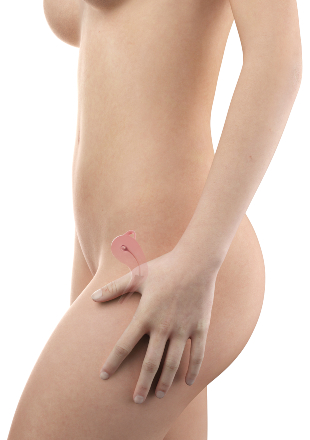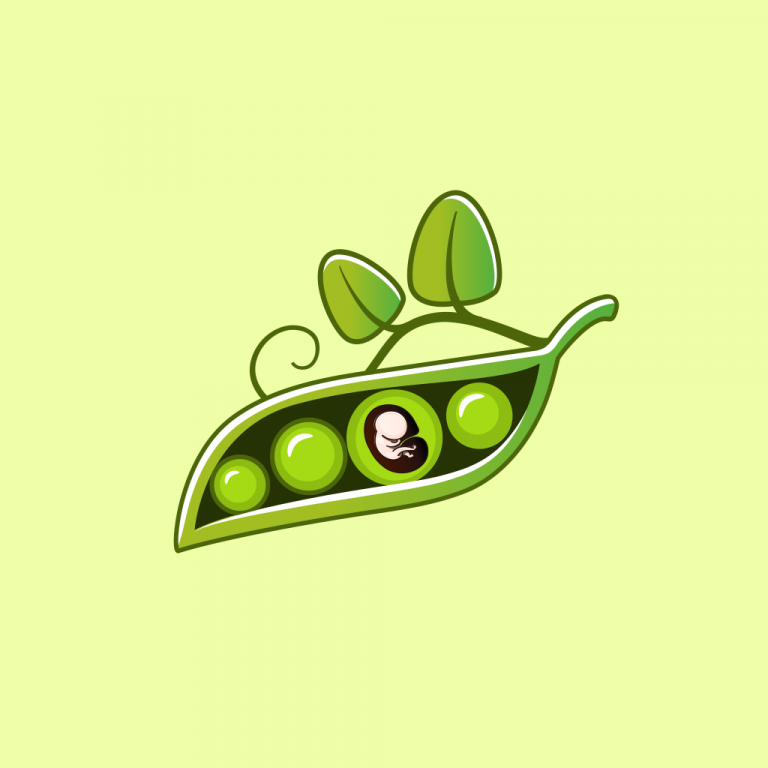Welcome to Week 2 of your pregnancy journey! It’s perfectly normal if you feel a mix of curiosity and excitement right now. While it may seem early, important things are starting to happen in your body—even if you can’t see or feel anything just yet. At this stage, you may not technically be pregnant, but your body is getting ready for when that first spark of new life will occur.
Week 2 usually means you’re about to ovulate, which is when one of your eggs is released and ready to meet a sperm. If you’re trying to conceive, this is the week when your chances of getting pregnant are highest. Even though you won’t get a positive pregnancy test result for at least a week. Everything starts coming together now.

Your hormones start working hard behind the scenes to make this possible. Estrogen levels rise, helping your uterine lining thicken—a supportive cushion for any fertilized egg. Your body is also working to make ovulation happen, preparing to release your best, healthiest egg this month. Some women feel a little twinge of discomfort or notice a change in vaginal discharge around ovulation, while others might not sense any difference at all. Both are normal.
If you’ve been tracking your cycle, you may notice this week’s signs:
- Clearer, more slippery vaginal mucus (a sign of peak fertility)
- Slight rise in body temperature just after ovulation
- Possible mild cramping or increased libido
This is a wonderful time to focus on your wellbeing. Try to eat a nutritious diet, keep active, and limit stress. All these little choices can help create the best environment for your new baby-to-be. And don’t forget, it’s okay to have questions or feel uncertain—every pregnancy is unique, and you’re already doing an amazing job taking care of yourself.
Soon, you’ll move into the earliest phase of pregnancy, and big changes will start. For now, Week 2 is all about preparation, hope, and setting the stage for the magic that’s about to unfold.
Your Baby’s Development This Week
Week 2 of pregnancy is a unique stage—it can feel a little funny to think about your baby’s development when there isn’t actually a baby just yet! Right now, your body is busily getting ready to make pregnancy possible, and these important behind-the-scenes changes set the stage for everything that comes next.
This is the week when your body is preparing for ovulation—the big moment when an egg is released and can meet with sperm to start a brand new life. Even though there’s no embryo or fetus at this early point, so much is already happening to support a healthy future pregnancy.
- Your Egg’s Journey Begins: Each month, your body tries to prepare one egg (sometimes more, but usually just one) to finish maturing. By the end of Week 2, this egg will be released from your ovary. It will be picked up by the end of your Fallopian tube and travel to the middle, ready to be fertilized. You may not feel it being released, though some women notice a brief ache or even a sharp side pain in the pelvis—this is sometimes called “mittelschmerz,” a sign of ovulation.
- Fertile Window: This week marks your most fertile days. The days at the end of Week 2 are when your chances of getting pregnant are at their highest if you’re trying. You might spot signs like a stretchy, clear vaginal discharge—nature’s way of helping sperm reach the egg. Tracking your cycle and paying attention to these subtle clues can help you time things just right if you’re hoping to conceive.
- Your Uterine Lining Prepares: Think of your uterus like a gardener preparing rich, soft soil. During Week 2, hormonal changes signal the lining of your uterus (the endometrium) to thicken up and get ready, just in case a fertilized egg arrives and needs a cozy place to settle in and start growing.
- Hormone Harmony: Even before pregnancy is official, hormones like estrogen and luteinizing hormone (LH) rise and fall in just the right pattern to support ovulation. You might notice subtle changes in your body: slightly fuller breasts, mild bloating, or extra sensitivity to smells. Every woman is different, so you may have many symptoms, or hardly any at all—that’s normal!
While your baby hasn’t begun to form yet, taking steps to care for yourself this week is one of the best ways to support a healthy pregnancy. If you haven’t started already, this is the perfect time to begin taking a daily prenatal vitamin with folic acid. These nutrients help make sure your body is ready to support a growing baby from the very first days, even before you know you’re pregnant.
This is also a great week to eat nourishing foods, drink plenty of water, and limit things like soda, caffeine, and processed snacks. Avoid alcohol and smoking, as these can impact early development—even before a positive pregnancy test.
If you have any questions—maybe about fertility, your health history, or what steps to take next—don’t hesitate to reach out to your healthcare provider. Every journey to motherhood is unique and having a caring support team makes all the difference.
Even if things feel a bit ordinary right now, remember: every big story starts somewhere. These quiet changes mean your body is doing extraordinary preparation, planting seeds for what’s to come. In just a matter of days, the magic of conception may begin, starting the remarkable journey of your baby’s life.
Changes in the Mother’s Body
During Week 2 of pregnancy, your body is preparing for one of its most exciting jobs: making a home for a soon-to-be tiny guest. Even though you’re not technically pregnant yet (conception usually happens near the end of this week or next), there’s a lot going on inside that you might notice—or not notice at all!
Let’s walk through some key changes and what they might feel like for you.
- Your Hormones Are Hard at Work: Your brain releases special chemicals to signal your ovaries that it’s almost time to release an egg. This is called ovulation. Because of this, you may feel a bit different—some women notice a burst of energy, a lighter mood, or even a boost in their sex drive thanks to this natural hormone surge.
- Cervical Mucus Says “Go!”: If you check your underwear or use tissue, you might notice a slippery, almost egg-white-like fluid. This is your cervical mucus becoming thinner and stretchier, helping sperm reach the egg. It’s actually your body’s way of saying it’s your most fertile time!
- Ovulation Sensations: As ovulation approaches, some women feel a mild twinge or ache on one side of the lower belly. This is known as “mittelschmerz,” which simply means “middle pain” in German. It’s perfectly normal and just a sign that your ovary is getting ready to release an egg.
- Breast and Body Sensitivity: Your breasts might feel a little tender or swollen. Some women also notice their sense of smell is stronger than usual, or they feel a bit bloated. Changes like these are all linked to your body’s rising estrogen and readiness for a possible pregnancy.
- Lining Up for Baby: Quietly, your uterus is working behind the scenes. The lining (endometrium) becomes thick and rich in nutrients, creating a soft, welcoming spot where a fertilized egg can settle in. You won’t see or feel this happening, but it’s one of your body’s amazing preparations.
- Spotting and Discharge Changes: You may notice a little light spotting or changes in your discharge. Both can be totally normal and are simply the result of hormonal ups and downs related to ovulation.
During this preparatory time, you might not look or feel any different on the outside. But your body is busy getting everything ready “just in case.” Small changes and sensations, if you notice them, are usually nothing to worry about, but they’re good reminders that things inside are working as they should.
Remember, everyone’s experience is unique: some women feel many signs, while others barely notice this phase at all. Both are completely normal. Focus on taking care of yourself—rest, good nutrition, and a bit of gentle exercise can give your body a healthy boost as it gets ready for possible conception. And if you ever have questions or notice anything that feels out of the ordinary, your healthcare provider is there for you every step of the way.
What Medical Checkups or Screenings Are Needed at Week 2?
At Week 2 of pregnancy, you might be surprised to learn that you aren’t technically pregnant yet—your body is just getting ready for the big moment of conception! Even though there isn’t an embryo yet, this is an ideal time to make sure you’re as healthy and prepared as possible for pregnancy. Here’s what you can expect and what steps you might consider taking now:
- Preconception Visit: If you’re trying for a baby, booking a preconception checkup with your healthcare provider can be very helpful. This is a friendly, low-pressure appointment where you can talk about your health history, ask questions, and make sure your body is ready for pregnancy.
- Medication Review: Bring a list of all medicines, vitamins, and supplements you’re taking. Your doctor can make sure they’re safe for pregnancy or suggest better options if needed.
- Immunity Checks: Your provider might want to check if you’re immune to certain illnesses like rubella or chickenpox, which can affect your pregnancy if you catch them. If you’re not immune, you may be offered vaccinations before trying to conceive.
- Health Condition Screening: If you have any long-term health issues—like thyroid problems, diabetes, or high blood pressure—now is the time to talk about how these might affect pregnancy. Your provider can help you get these conditions under the best possible control.
- Starting Prenatal Vitamins: Pregnancy providers recommend starting a prenatal vitamin that includes at least 400 micrograms (mcg) of folic acid, even before you get pregnant. This helps protect your baby from certain birth defects that can develop very early on.
- Lifestyle Conversations: This appointment is a good time to ask about healthy habits. For example, your doctor can guide you on safe levels of caffeine, healthy foods to include, and things to avoid like smoking or alcohol.
- Questions or Concerns: If you’ve been trying to get pregnant for a while or have concerns about your menstrual cycle, now’s the perfect time to bring them up. Even if everything seems fine, having that extra support and clarity is always reassuring.
Remember, most regular prenatal visits won’t start until after you’ve missed your period (about Week 8). But taking these early steps gives you the best foundation for a healthy pregnancy. Think of it as laying the groundwork for you and your future baby—one caring choice at a time!
Nutritional Tips and Physical Exercise
At Week 2 of your pregnancy journey, even though you might not be pregnant just yet, your body is working behind the scenes to get ready. This is the perfect time to give yourself a healthy boost, both through what you eat and how you move. A few small changes now can give you the best possible start, whether you’re hoping to conceive this cycle or just planning ahead.
- Fuel Up with Key Nutrients:
- Include a variety of colorful fruits and veggies—these are packed with vitamins, minerals, and antioxidants that support your overall wellness and help your body get ready for pregnancy.
- Don’t skip whole grains like brown rice, oats, or whole-wheat bread. They give you lasting energy and keep your blood sugar steady.
- Pick protein from different sources: think grilled chicken, fish (choose those low in mercury like salmon), eggs, beans, tofu, and even unsalted nuts.
- Add foods high in iron, such as spinach, lentils, or fortified cereals, to help your body build up healthy red blood cells in preparation for potential pregnancy.
- Keep Meals Balanced and Enjoyable:
- Strive for a mix of protein, healthy carbohydrates, and a little healthy fat at meals—an example? Grilled chicken with roasted sweet potatoes and steamed broccoli.
- If you’re busy, whip up fruit smoothies, veggie omelets, or simple stir-fries for quick, nourishing options.
- Stay Well-Hydrated:
- Aim for at least 6 to 8 glasses of water each day. Water helps every cell in your body work its best and keeps your energy up.
- Keep a water bottle handy—sip often, especially if you feel thirsty during the day.
- Smart Choices for Your Future Baby:
- Eliminate alcohol—it can affect your hormones and early development before you even know you’re pregnant.
- Cut down on caffeine if you’re a coffee or tea lover. Try to stay below 200 mg per day—about one 12-ounce cup of regular coffee.
- Skip fad or crash diets. Now’s the time for gentle, long-lasting healthy habits.
- How Exercise Helps Even Before Pregnancy:
- Regular movement can help balance your hormones and even make ovulation more predictable.
- Brisk walks, gentle bike rides, swimming, or even dancing in your living room are excellent ways to stay active. Try for at least 30 minutes most days.
- If you’re new to exercise, start with 10- or 15-minute bursts. Even a short stroll after a meal can make a difference.
- Don’t worry about a fancy gym routine—what matters most is consistency and listening to your body.
- Don’t Forget Self-Care:
- Gentle stretching or yoga can reduce stress and help your body feel more comfortable as it prepares for what’s to come.
- A good night’s sleep (aim for 7–9 hours) will also help your hormones and energy stay on track.
If you feel unsure about your diet, activity level, or a specific health question, reach out to your doctor or a registered dietitian—they’re there to guide you every step of the way. Most importantly, take things one day at a time, and remember every little choice you make can help set the stage for a healthy pregnancy when the moment is right.
Weekly Checklist
Week 2 might feel a little mysterious since you may not even be pregnant yet, but what you do now can truly set the stage for a healthy pregnancy. Here’s your checklist for this important week:
- Notice Your Body’s Cues: Watch for signs that you’re ovulating — things like extra clear or stretchy cervical mucus, a slight cramp on one side of your abdomen, or feeling a bit more energetic than usual.
- Make Room for Healthy Habits: Focus on getting enough sleep, finding ways to relax, and moving your body. Gentle walks, stretching, or even dancing in your living room are all wonderful ways to support your health right now.
- Boost Your Nutrition: Choose meals full of colorful fruits and veggies, whole grains, and healthy proteins like chicken, fish, tofu, or beans. This helps give your body what it needs to welcome a pregnancy.
- Stay On Top of Hydration: Keep a water bottle handy and sip throughout the day. Your body needs plenty of fluids to keep your systems running smoothly, especially as it gets ready for ovulation.
- Start (or Keep) Taking Prenatal Vitamins: Make sure you’re taking a daily prenatal vitamin that contains at least 400 micrograms (mcg) of folic acid. This helps protect your future baby’s brain and spine development from the very start.
- Review Your Medications: Take time to look over any medicines, herbs, or supplements you use, and talk to your healthcare provider to be sure they’re safe for pregnancy.
- Cut Out Harmful Substances: If you drink alcohol, smoke, or use any recreational drugs, now’s the time to stop or seek help. These can affect your chances of conceiving and may harm a developing baby.
- Limit Caffeine: Try to keep your caffeine intake below 200 mg each day (about one 12-ounce cup of coffee). If you love coffee or tea, consider mixing in decaf or herbal options to help stay under this limit.
- Schedule a Preconception Appointment: If you haven’t already, book a visit with your women’s health provider or midwife. It’s a good opportunity to ask questions, review vaccines, and talk about any health concerns before pregnancy begins.
- Track Your Menstrual Cycle: Use a calendar or a phone app to note the first day of your period, cervical mucus changes, or any ovulation symptoms. This can help you better understand your cycle and time conception if you’re trying to get pregnant.
- Be Kind to Yourself: Remember, this is a time of preparation. It’s okay to feel excited, nervous, or even a little impatient. Surround yourself with supportive friends or family, and celebrate the small steps you’re taking for your future baby.
When to Call Your Provider
Even though Week 2 is mainly about your body getting ready for pregnancy, it’s always good to know when you should reach out to your healthcare provider. Most women won’t have anything unusual at this stage, but being aware can help you feel more confident and prepared. If you notice any of the following, give your doctor or clinic a call:
- Heavy or Unusual Bleeding: Light spotting can happen around ovulation, but if you have bleeding that’s much heavier than your regular period or continues for many days, it’s a good idea to check in.
- Severe Pain: A mild pinch or twinge (sometimes called “mittelschmerz”) is normal for some women during ovulation. However, sharp or ongoing pain in your lower belly or pelvis that doesn’t go away could be a reason to seek medical evaluation.
- Fever or Chills: If you develop a fever—especially with pain or unusual vaginal discharge—you should ask for help to make sure that there’s no infection that needs attention.
- Odd or Strong-Smelling Vaginal Discharge: While it’s normal for discharge to get clearer and a bit stretchy around ovulation, other types of discharge can cause discomfort. That would be another reason to seek medical advice.
- Signs of Infection: Burning when you pee, needing to go much more often, or lower abdominal pain may point to a urinary tract infection.
- Unexpected Allergic Reactions: If you start any new vitamins or supplements this week and develop a rash, itching, swelling, or trouble breathing, stop taking the supplement and call your provider right away.
- Worsening Chronic Medical Problems: If you have an ongoing health issue (like diabetes, high blood pressure, or thyroid disease) and notice changes in your symptoms, don’t wait—reach out for expert advice.
- Questions About Medications: If you’re unsure if a current prescription, over-the-counter drug, or supplement is safe as you start trying for a baby, call and double-check with your provider.
Remember, it’s always ok to ask questions—even if you’re not sure if something is serious. Your healthcare team is there to support you, no matter where you are in your journey to parenthood. When in doubt, trust your instincts and reach out—you know your body best!
Preparations for Baby
Even though you aren’t technically pregnant just yet, this is a wonderful time to quietly set the stage for your growing family. A little preparation now can help you feel calm and confident in the months ahead. Here’s how you can get your mind and home ready during Week 2:
- Create a cozy corner: Choose a corner or small space in your home where you can start gathering things that make you feel peaceful and happy—like a soft blanket, a favorite candle, or a journal for your thoughts and dreams for your future baby.
- Focus on stress relief: Give yourself permission to slow down at the end of each day. Try gentle stretches, a calming playlist, or simply a few minutes with your feet up and a warm (non-caffeinated) drink.
- Double-check household safety: Glance around your home for anything that might need updating—like smoke detectors, working nightlights, or removing any strong cleaning chemicals from easily accessible spots. These small steps add up to a safer environment for you and your future little one.
- Talk with the dad or support person: Share how you’re feeling and discuss hopes or worries. Finding little ways to support one another early on can make a big difference when the real adventure begins.
- List your wishes: Keep a notepad handy for jotting down things you hope to remember—snacks you’d like to keep on hand, family traditions you want to start, or even names you love. This simple task can help everything feel a little more real and exciting.
Remember, your well-being matters so much—not just for you, but for your future baby too. Take this week to care for yourself and gently start building the world your baby will one day call home.
Citations and References
- American College of Obstetricians and Gynecologists (ACOG) – Details the importance of preconception care, prenatal vitamin (folic acid) recommendation, and timing of conception in relation to the menstrual cycle. Visit Source
- Mayo Clinic – Explains gestational age calculation, ovulation timing, prenatal vitamin advice, and nutrition recommendations before conception. Visit Source
- Cleveland Clinic – Provides an overview of early pregnancy weeks, ovulation, lifestyle tips, and why pre-pregnancy health matters. Visit Source
- Centers for Disease Control and Prevention (CDC) – Emphasizes tracking menstrual cycles, planning for pregnancy, folic acid use, and avoiding harmful substances before conception. Visit Source
- National Institutes of Health (NIH): MedlinePlus – Reviews conception, ovulation, and steps to take before getting pregnant, including recommended checkups and supplements. Visit Source
- World Health Organization (WHO) – Advises on alcohol, caffeine, tobacco, and substance avoidance when planning pregnancy and during early prenatal stages. Visit Source










